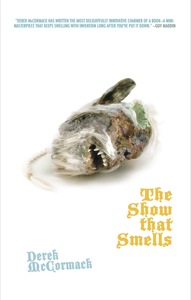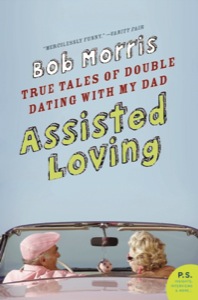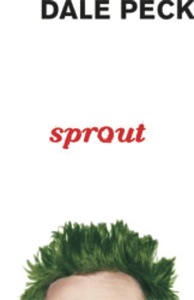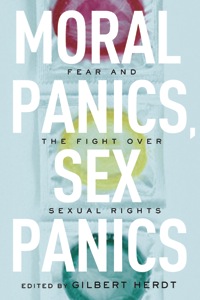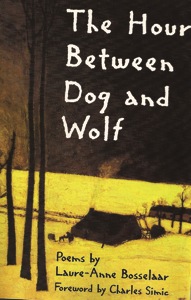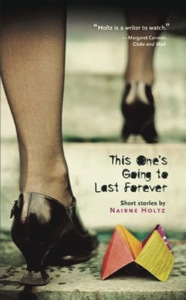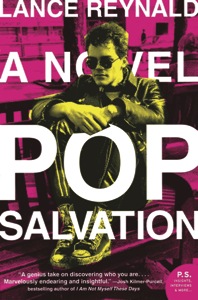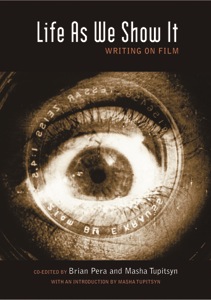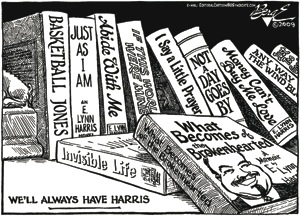feature
Splash into summer books
Published Thursday, 20-Aug-2009 in issue 1130
The Show That Smells
by Derek McCormack
Akashic Books/Little House on the Bowery
112 pages, $15.95 paper
This tenth title in a sublime literary imprint, curated smartly by Dennis Cooper for Akashic, is a creepy gem that’s both grotesquely horrific and terrifically hilarious – a most inviting if uncommon combo. There isn’t much by way of plot: Parisian fashion designer Elsa Schiaparelli’s famed perfume Shocking! figures prominently, with Elsa refigured riotously as a vampiric baby-killer whose perfume contains a seductively vindictive drop of blood; Coco Chanel’s eponymous perfume sears the skin off Lon Chaney; country crooner Jimmie Rodgers is tubercular, so his wife aims to sell her soul to Schiaparelli to save him; and a reporter named Derek McCormack pops up to comment on the absurdist goings-on. Narrative coherence is neither point nor purpose of this feverish, dark carnival of rambunctious wordplay, inventive punctuation and, particularly, hyperbole not meant for those with delicate sensibilities. As in: “At my vampire carnival, you’ll win balloons made of babies – soft skin stretched out and stitched and blown full of air. That balloon has eyebrows!” Take a deep, calming breath, and revel in mad genius.
Assisted Loving: True Tales of Double Dating with My Dad
by Bob Morris
Harper Perennial
306 pages, $14.99 paper
Bob Morris and his octogenarian Lothario of a father, Leo, never do actually double date in the course of the parallel yearning for romance chronicled in this endearing memoir. Bob himself has been serially unlucky on the dating scene, and single queers will identify with a wince with his accounts of disastrous dinners and unsettling one-night stands. His dad, meanwhile, is a cranky, randy old man, ready for a woman to take care of his daily needs, sexual and otherwise, following the death of his wife after a decade-long lingering disease. Leo is a domineering right-wing Republican, and Bob doesn’t sugarcoat their turbulent to-and-fro in the least; nor does he soft-pedal what he perceives as his own love-handle shortcomings. But, in their own way, father loves son and son loves father, despite a contentious relationship – again, a reality with which many a mature queer man is likely to identify. Both Morris the elder and Morris the younger find soul mates after all – but Bob recounts even that happy outcome with a refreshingly saccharine-free poignancy.
Mean Little deaf Queer
by Terry Galloway
Beacon Press
248 pages, $23.95 hardcover
Most among us acknowledge being queer; few of us self-identify as mean; even fewer of us are deaf; and who wants to be perceived as little? Galloway, hilariously and harrowingly, embraces them all with gusto and infuses them all with bravura. Born with hearing, the author lost that connection to the world at age 9, the after-affect of an experimental antibiotic her mother was given while pregnant. As a child she raged at her boxy hearing aids, spitefully faked her death at a summer camp for cripples (there’s much that is gleefully un-PC here) and confronted the xenophobic homophobia of the American South in the Cold War era. For all that, she turned out to be quite a spite-free adult, happy in love and brave in life, both a cultural warrior and a settled woman. This unflinching episodic memoir, skipping through the tortures and triumphs of the author’s adolescence and young womanhood, depicts the double outsider burden of being deaf and lesbian – a self-described “child freak” – with comic, sometimes caustic candor.
The Mariposa Club
by Rigoberto Gonzalez
Alyson Books
216 pages, $14.95 paper
The “Fierce Foursome” of largely Hispanic Caliente Valley High are a varied bunch of gay lads. Isaac is the only white boy, the envy of even straight boys when he walks nude through the locker room. Trinidad – Trini for short – is fiercest of the quartet, prone to feminine pronouns and pronounced makeup. Liberace – Lib – is a pudgy, budding queer firebrand (and, sad to say, absent from the cover art, which depicts only three buff hunks: overweight homos don’t sell books). Mauricio – Maui – is the story’s narrator, and something of a square, with the most level head among the buddies bonded by their otherness. Gonzalez recounts the teens’ senior-year effort to create a GLBT club with typical YA tropes – the principal is evasive and most fellow students are hostile. But families, friendship and the emotional agonies of growing up, more than just high school homophobia, are at the heart of the novel, the first of a projected trilogy. Young adults may be the target audience, but older readers will appreciate the author’s mature storytelling.
The Creamsickle
by Rhiannon Argo
Spinsters Ink
268 pages, $14.95 paper
Bois, boards, baby butches and bed hopping: Argo’s angsty fiction debut, centered on the shenanigans of a crew of gender-fluid young women, should perhaps come with an age-appropriate label. Old folks – anyone over 40, more or less – ought to be adolescent at heart, or at least nostalgic for their own adventurous youth, to fully engage with its feisty plot. The effort, however, will be rewarded. The residents of The Creamsickle – a ramshackle San Francisco Mission District Victorian crash pad where art and anarchy reign – are a sexually rambunctious lot. Central to the story is Georgie, a hapless romantic tomboi-turned-stripper with a tough exterior and a yen for self-destructive punk rock girls, and her skater pals Cruzer, a tough Mexican-American girl with a soft heart and a talent for photography, and Soda, who starts the cheerfully unruly story about the queerest of queer families as “her” and ends it as “him.” Argo, who is touring this fall with dyke-spirited Sister Spit, brings the energy of live performance to this affectingly offbeat depiction of queer young lives.
The 38 Million Dollar Smile
by Richard Stevenson
MLR Press
288 pages, $14.99 paper
For most of the previous nine books in Stevenson’s venerable Donald Strachey, PI novels, Albany, New York and environs has been the prosaic (but nonetheless wryly entertaining and quite queer) setting. This time, and to atmospheric effect, the sleuthing relocates to Thailand, where Strachey and his loving companion, Sidekick, are searching for steel company scion Gary Griswold, who has vanished along with his $38 million inheritance. It’s safe to guess that the author and his real-life partner have spent recent tourist time in Thailand; the story is salted with colorful references to such Bangkokian street delicacies as bird-spit beverage, pig colon and buffalo gums. Yum. And in context, they do sound delicious. Stevenson is as enthralled with the country’s “land of smiles” culture as he is with the cuisine, to the extent that the plot’s perilous twists and menacing treacheries are almost secondary to how the sexual, political and karmic tones of Thailand are captured with an outsider’s wise eye. As much travel memoir as mystery, this tenth in a series spanning three decades is supremely satisfying as both.
Sprout
by Dale Peck
Bloomsbury USA
288 pages, $16.99 hardcover
Not so many months ago, Peck’s sexually horrific, viscerally terrific Body Surfing was released. This young adult novel, the author’s first, is work of a kinder, gentler sort. It’s the charming yet sharp-edged story of 16-year-old, openly gay Daniel “Sprout” Bradford – “sprout” because he has defiantly dyed his hair a lush green – as he navigates the very square halls of his rural Kansas high school with snarky self-assurance and a vocabulary endearingly beyond his years. More an “out, so what” than a classic coming out story, Peck’s invigorating YA effort embraces numerous tropes of the genre – beloved dead mother, emotionally absent and alcoholic father, best girl friend who “gets” him, understanding teacher who detects talent under a smartass surface, sex on the side with a jock hunk, eventual bonding with another boy, unlikely outsider who wins Sprout’s heart. But this word-rich novel imbues these sometime stereotypes with extra dimension, adding complexity to a plucky adolescent’s earnest search for illusive love and settled self-knowledge.
Moral Panics, Sex Panics: Fear and the Fight Over Sexual Rights
edited by Gilbert Herdt
NYU Press
304 pages, $24 paper
When it comes to such issues as sex education in schools and same-sex marriage, AIDS prevention and private-use pornography, or black sexuality and abortion rights, the response from the political and the Christian right is, unerringly, honed self-righteous hypocrisy and focus-grouped hysterical panic. For cultural and sexual activists, challenging the manufactured panic around these matters is a given. In this six-essay collection, with an astute introduction from editor Herdt, social scientists and scholars of sexuality (more of them women than men) dissect where such loathing for personal freedoms originates, how maniacally it is deployed and whether there is an effective response to the fomented onslaught of anti-woman, anti-gay and anti-sexual moral puritanism. For lay readers, this study’s prescription for taking the offensive high ground against the fundamentalists’ low-blow denial of rights may well be heavy going. But individuals and activist groups committed to the progressive struggle for cultural and sexual freedoms will find smart analysis and crucial advice in a timely academic call to arms.
The Hour Between Dog and Wolf
by Sebastian Stuart
Alyson Books
248 pages, $14.95 paper
When nascent queer Arthur McDougal skips classes too often for his parents and the posh Manhattan private school that bores him, it’s off to a faintly religious rural Connecticut academy – with loose admission standards – for him. That’s the late ’60s setting for Stuart’s intelligently nuanced take on the standard queer coming out trope, which – despite the characters’ youth – is aimed at not-so-young adults. Young Arthur gravitates to the school’s more louche crowd, most notably emotionally troubled Katrina Felt, daughter of a Hollywood movie star, who knows her new friend is a gay boy before he does, and Sapphire, the era’s quintessential, lusty hetero-hippy chick – with hunky townie Lenny added to the mix to fire up Arthur’s hormones. Stuart’s depiction of their inevitable end-of-adolescence sexual escapades, drug dalliances and cocky rebellion against school authority propels the narrative. But the real power of this stylish solo debut – Stuart has co-written one novel, ghostwritten another – lies in how its characters evolve from boys and girls to men and women, with all the strengths and flaws that process involves.
This One’s Going to Last Forever
by Nairne Holtz
Insomniac Press
232 pages, $15.95 paper
The title of this stellar collection of seven short stories and one centerpiece novella is a glorious if hopeful lie: that relationships seldom last forever. Yet Holtz’s brave fictional insights about young life and love are a tonic. So, too, is her embrace of sexual fluidity; her queer characters (most, but not all of them women) pass through periods of lusting for opposite – rather than same-sex bodies – or minds. The opener, “When Gay is the New Straight,” is a deceptively laid-back tale about an Elvis-impersonating gay man who officiates at a drive-through wedding chapel while having an affair with an ostensibly straight man who’s on his way to marrying a woman. And though dykes across the Kinsey spectrum inhabit the rest of the collection, Holtz weaves a good number of other boys, questioning and otherwise, throughout – she’s a lesbian writer with delicious cross-gender appeal. None of the stories pall, but the standout is “Are You Committed?” It dwells on the political and sexual angst of college students with spot-on resonance.
Pop Salvation
by Lance Reynald
HarperCollins
272 pages, $13.99 paper
It’s Andy Warhol, Marilyn Monroe and The Rocky Horror Picture Show to the rescue in this ’80s-set novel-lite. Caleb Watson is a queeny queer boy, bullied by his Washington, D.C., private school peers, who finds solace – and a sense of self – by re-imagining his harsh high-school world as Warhol’s Factory. He replicates on a teen scale the platinum-wigged artist’s refuge for sexual and artistic outsiders and casts himself quite consciously as a “pint-sized” Andy, fierce leader of his fellow outcasts. These include ethereally beautiful Aaron, an athletic but shy lad with inner passion; street kid Brit, a young boy who can pass any time for Marilyn; and child-of-socialites Sonia, whose rebellion against her upper-class breeding involves cultivating a yen for fey boys. Reynald’s debut is more a series of vignettes infused with the glam culture of its era – including a soundtrack of references to New Wave and BritPop – than it is a traditional novel. But its portrayal of courageous adolescence, particularly the sweetly subsumed romance between Caleb and Aaron, is wholly satisfying.
Life As We Show It: Writing on Film
edited by Brian Pera and Masha Tupitsyn
City Lights Books
304 pages, $18.95 paper
Dodie Bellamy immerses herself in thoughts of E.T. while coping with her mother’s dying. Wayne Koestenbaum riffs on the gender “puzzle” that is Elizabeth Taylor. Bard Cole considers both the veiled porn implicit in mainstream movies featuring young men, and the life of erotica icon Joey Stefano. Richard Grayson exhumes the film screens of his Florida youth. Abdellah Taia, sitting with his dozing mother in a darkened Moroccan room, recalls finding sexual self-realization watching a queer French movie on TV. Rebecca Brown overlays her own life with imagery from classic westerns. In these smart essays, few short stories, a poem and a screenplay, 25 entries in all, contributors – obviously smitten by cinema both contemporary and classic – cast a personal eye on a universal medium. They aren’t reviewing films, though. Instead, these writers muse on how film and life are intertwined, how they find themselves on screen and those screens in turn reflect them. Settle in with a box of Twizzlers and revel in the provocative thinking in this fresh take on popular culture.
Footnotes
• E. Lynn Harris, the author of 10 New York Times-bestselling books – a feat no other gay author has accomplished – died in his sleep July 23, apparently of heart failure, while touring in California to promote his most recent novel, Basketball Jones. Harris, who in 1991 peddled his first self-published novel, Invisible Life, to Atlanta-area beauty salons from the trunk of his car, has two more novels scheduled: Blame It on the Sun, a July release, and Mama Dearest, due in October – though his publisher, Simon & Schuster, has no listed information about the latter and a tentative publication date.
• Financial uncertainty is facing two of America’s dwindling number of GLBTQ bookstores: Giovanni’s Room in Philadelphia, the oldest surviving gay bookshop, is turning to customer support to help cover the $50,000 cost of rebuilding a structurally unsound outside wall – though the store will remain open during reconstruction, says owner Ed Hermance. Meanwhile, the owners of Common Ground Bookstore in Ann Arbor recently e-mailed customers seeking donations in order to stay open – the shop has been sustained by Keith Orr and Martin Contreras from their personal savings and with profits from another business.
• Science fiction and mystery writer Nicola Griffith and Scott Cranin, editorial and purchasing director at TLA Entertainment Group, are new members of the Lambda Literary Foundation’s board of trustees, joining president Christopher Rice, vice-president Linda Hill, treasurer Teresa de Crescenzo, secretary Judith Markowitz, and members Katherine V. Forrest, Joseph W. Lund and James A. Yokley.
“All monsters are queers, Monsieur Rodgers,” Schiaparelli says, sweeping into the scene. “Who is able to bring the dead back to life?” she says. “God and the Devil. The Devil makes dead men into monsters: immortal, immoral – and queer. Zombies are queer. Frankenstein’s monster was queer. It’s fitting. “How’s that?” Jimmie says. “Monsters must be scary,” she says. “What’s scarier than sodomites? Like the dead, sodomites carry disease. Sodomites, like the dead, dwell underground. Sodomites wear cosmetics like they’re corpses. Sodomites and dead men – they all smell like shit, and love it! Cemeteries are full of fairies. Vampires are the fairiest of all.”
– from The Show That Smells, by Derek McCormack
Everyone calls our house “The Creamsicle” because it looks like an orange Popsicle that has been dropped in the dirt a few times, since it’s painted a splotchy orange with a white trim that’s splattered with pigeon shit. Cruzer likes to also insist that the house especially deserves the cream part of the name because of its long-standing reputation as a queer bachelor pad. The house had been passed around and handed down like a good dirty joke, revolutionaries trampled its floors for 20 years, a slew of hippy fags and fairies lived there in the late ’80s, and the grunge lesbians overran it all through the ’90s.
– from The Creamsickle, by Rhiannon Argo
Aaron possessed the looks and charisma that would have him labeled a pretty boy. Beauty that implied tenderness. There was a darkness to all his features. Hair and eyes of the deepest browns were matched to olive skin that appeared permanently tanned. The beauty contrasted with a rugged physical quality that I imagined made him good at any sport. His bushy eyebrows peeked out from behind a wavy mane of black hair that was as thick as the eyelashes that gave the appearance of black eyeliner. In spite of his striking looks, he was very shy, in the same way that I was. He was the most beautiful boy I’d ever seen. And he became the first friend I ever had.
– from Pop Salvation, by Lance Reynald
Books to watch out for
• In Love is the Higher Law, young adult editor and author David Levithan tackles the emotional aftermath for three teens, two of them gay, of Sept. 11, 2001. (August, Knopf)
• Christoper Bram, author of nine acclaimed novels, collects a quarter century of nonfiction prose in Mapping the Territory, with essays about the power of gay fiction, coming out in Virginia in the ’70s, the sexual imagination of Henry James and the experience of seeing his novel Father of Frankenstein transformed into the film Gods and Monsters. It’s a September release from Alyson Books, as is a 20th anniversary edition of Heather Has Two Mommies, by Leslea Newman with illustrations by Diana Souza – fully illustrated in color for the first time.
• Through photographs, letters, and other selections from his vast personal archives, Gore Vidal’s Snapshots in History’s Glare paints a picture of the author’s intersection with Kennedy’s Camelot, his time on the set of Ben Hur, his friendships with notables from Eleanor Roosevelt to Tennessee Williams, his foray into the political arena and his sometimes fiery feuds. (October, Abrams)
• Adam Haslett, whose short story collection You Are Not a Stranger Here was a breakout bestseller, makes his fiction debut with Union Station, a novel revolving around Charlotte, a retired New England schoolteacher; her brother Henry, president of the New York Fed; Doug, a Boston financier whose garish home abuts Charlotte’s property; and Nate, an impressionable teenager. (January, Doubleday)
Books into film
Brent Hartinger’s young adult novel, The Geography Club, and Jeffrey Eugenides’ Pulitzer Prize-winning novel, Middlesex, have been optioned for film.
Queer-interest authors
Colm Toibin (Brooklyn), Sarah Waters (The Little Stranger) and William Trevor (Love and Summer) are among 13 novelists nominated this year for Britain’s top literary award, the $85,000 Man Booker Prize.
Toibin is also one of three international judges for the 2009 Man Asian Literary Prize. The 24 nominated novels, all from Asian-Pacific authors, include Leche, Zamora Linmark’s sequel to Rolling the R’s, about young life, gay and otherwise, in Hawaii; Tom Rob Smith’s Stalin-era Russian thriller, Child 44, a novel with a substantial queer subplot, won Best First Novel earlier this year from the International Thriller Writers. Meanwhile, the Horror Writers of America selected Unspeakable Horror: From the Shadows of the Closet, edited by Vince A. Liaguno and Chad Helder, as winner of the Bram Stoker Award for Best Anthology.
German photo-art
Publisher Bruno Gmünder is coming out in October with Ultimate Falcon, a 400-page collection of pin-up photography featuring the porn studio’s almost-40-year roster of hunky performers; the $99 book showcases erotica legends Casey Donovan and Al Parker, contemporary bodybuilder Matthew Rush, and newcomer Brent Corrigan on the cover.
|
|
Copyright © 2003-2025 Uptown Publications

